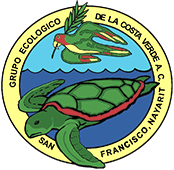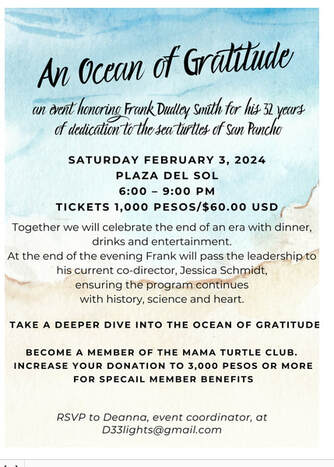~ Newsletter No. 263, January, 2024 ~
Hola Volunteers and Supporters ~
Except for the last eight nests, the 2023 nesting season came to a crazy end around New Year’s night, although there will be countless late nests throughout the chilly Winter and Spring months. The incubation of these nests will be difficult due to the cold sand, which will produce all male hatchlings.
Now the totals of our 2023 nesting season.
The total recorded nests came to 1,118
401 were relocated on the beach into better locations
680 nests were incubated in the box nursery
37 nests were taken by poachers
81,037 hatchlings were released to the sea
1,694,185 hatchlings have been released since the beginning in 1992
As mentioned above, over the next six months, an additional 30 to 60 late nests will end up on our beach. Humans must allow these nests to hatch naturally as they have for millions of years. Human interference will weaken their ability to swim far out to sea and may unfortunately lead to their early death.
Widecast, the world’s leading authority regarding the care of marine turtles, has identified several problems digging up hatchlings too early, holding them in containers, and selling the hatchlings to hotels and resorts or even releasing them to receive donations as the lead cause of death of millions of hatchlings around the world. Believe it or not, it’s happening here in our area almost every week, unfortunately just for the entertainment of tourists. Please make sure you check the credentials of any organization providing public releases to verify they operate in the best interest of the turtles.
An overpopulation of males can be a problem during mating, especially if three or more males begin fighting during mating of the female. Often, the fighting will drown the female since she is on the bottom and cannot find air. See Fighting to mate This is the reason why we do not collect nests during the cold months, we must all allow these nests to hatch naturally as they have for millions of years.
All the egg shells, dead hatchlings, and sterile eggs that had been carelessly scattered on the beach have been cleaned up.
As for the Leatherback, her nesting season begins around mid-November and ends in mid-April. To date, we have found three nests on Playa Questo and one Eastern Pacific nest. They are all under the protective eyes of our volunteers.
My two daughters and I returned from a late evening dinner and found a cat on my doorstep. In the dark, I thought it was my cat, Jacky, I opened the door and pushed him inside, and noticed it was not one of my cats. The cat, a young male, was blind and deaf. Someone knowing I would be sympathetic had placed him on my doorstep, just what I needed a blind cat. He quickly discovered the layout of the house, the sandbox, food, and water, selected a place to sleep and has rapidly become one of our cats.
Releasing of hatchlings: As mentioned above, we have reached the end of the 2023 nesting season, and unfortunately, without hatchlings, we will not be able to hold our Friday evening hatchling release, not until mid-August of next year. We want to thank the organizers of the releases: Elvia Garcia, Odette Brunel, Susana Ayón, Ulises Ledesma González, Deanna Covington, and Blanca G.
January staff and volunteers: Steve Raschke, Elvia Garcia, Jessica Schmidt, Karen Sorum, Hallie Loveridge, Nick Sanders, Odette Brunel, Taylor Kimbell, Susana Ayón, Ulises Ledesma González, Deanna Covington and Blanca G. If you or someone you know is interested in helping us next summer, the 2024 nesting season, you can sign up by going to our Volunteer application page, and please spread the word about our volunteering opportunity.
We have one apartment for rent from February through May. This apartment is fully furnished, with all utilities paid, including a telephone, high-speed fiber optic internet, including all appliances. It is in a relatively quiet area near Los Olas. The rent for apartment #1 is $1,200 per month. Call (322) 154-0077 or (311) 258-4100.
A good way to financially help Grupo Ecológico is through our 501-C-3 tax-deductible donation site. To donate, you can contact Travler, a US charity organization that has supported Grupo Ecológico for several years. Click on this link to make a tax-deductible contribution.
Weather-wise: January daytime temperatures range in the mid-80° to mid-70°, while nighttime temps are mid to high-70° to mid-60°. January rainfall was 2.58 inches, and for the year the amount came to 45.41 inches. All around good weather.
A heartfelt thanks to all our many donors, you are our heroes: Patricia Schmidt, Karen Wilson, James Mitchell, Caren Elkan, Ann Medlin, Brian Culligan, Julie Bidgen, Venkat Reddy Chitti, Susan Stephens, Kiley Branson, Mike and Cindi Whitehead, (2) Kiley Branson, Jennifer Nelsen, (1) Steven Ogden, Jhoni Marchinko, Mandy Thompson, (2) Steven Ogden, Tania Brightman, Morgan Elsier (3) Steven Ogden, Brian Baludek and Patricia Mallett. Please help if you can by contributing to our website PayPal link.
Frank Smith, Director.
Jessica schmidt, CO-Drector
Elvia Garcia, Secretary
Grupo Ecológico de la Costa Verde, A.C.
Our email is: [email protected]
Our website is: http://www.project-tortuga.org
Our Facebook site is: San Pancho Marine Turtle Conservation
Instagram: https://www.instagram.com/projecttortugasanpancho
Unsubscribe
Come Visit our Turtle Nursery!
Call in advance so we can prepare for your visit!
Please Note that we work at Night so Morning Calls May be Missed.
|
Grupo Ecologico de la Costa Verde
102 America Latina, San Pancho, Nayarit, Mexico Tel: 311-258-4100 Email: [email protected] [email protected] |




